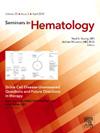将 RNA 剪接作为骨髓增生异常综合征的治疗靶点。
IF 4.1
3区 医学
Q1 HEMATOLOGY
引用次数: 0
摘要
骨髓增生异常综合征(MDS)是一类异质性血液病,多见于 60 岁以上的人群。骨髓增生异常综合征患者表现为外周血细胞减少,疾病进展为急性髓性白血病(AML)的风险增加。剪接因子突变(包括基因 SF3B1、SRSF2、U2AF1 和 ZRSR2)是在 50% 以上 MDS 病例中发现的早期事件。这些突变会导致前 mRNA 剪接异常,并影响 MDS 的病理生理学。新的证据显示,剪接因子突变细胞对针对剪接体、异常剪接基因和/或其调控分子通路的干扰更敏感。本综述总结了目前针对剪接因子突变治疗 MDS 的治疗策略和正在进行的工作。本文章由计算机程序翻译,如有差异,请以英文原文为准。
RNA splicing as a therapeutic target in myelodysplastic syndromes
Myelodysplastic syndromes (MDS) represent a heterogeneous group of hematological disorders and are more commonly found in people over the age of 60. MDS patients exhibit peripheral blood cytopenias and carry an increased risk of disease progression to acute myeloid leukemia (AML). Splicing factor mutations (including genes SF3B1, SRSF2, U2AF1, and ZRSR2) are early events identified in more than 50% of MDS cases. These mutations cause aberrant pre-mRNA splicing and impact MDS pathophysiology. Emerging evidence shows that splicing factor-mutant cells are more sensitive to perturbations targeting the spliceosome, aberrantly spliced genes and/or their regulated molecular pathways. This review summarizes current therapeutic strategies and ongoing efforts targeting splicing factor mutations for the treatment of MDS.
求助全文
通过发布文献求助,成功后即可免费获取论文全文。
去求助
来源期刊

Seminars in hematology
医学-血液学
CiteScore
6.20
自引率
2.80%
发文量
30
审稿时长
35 days
期刊介绍:
Seminars in Hematology aims to present subjects of current importance in clinical hematology, including related areas of oncology, hematopathology, and blood banking. The journal''s unique issue structure allows for a multi-faceted overview of a single topic via a curated selection of review articles, while also offering a variety of articles that present dynamic and front-line material immediately influencing the field. Seminars in Hematology is devoted to making the important and current work accessible, comprehensible, and valuable to the practicing physician, young investigator, clinical practitioners, and internists/paediatricians with strong interests in blood diseases. Seminars in Hematology publishes original research, reviews, short communications and mini- reviews.
 求助内容:
求助内容: 应助结果提醒方式:
应助结果提醒方式:


